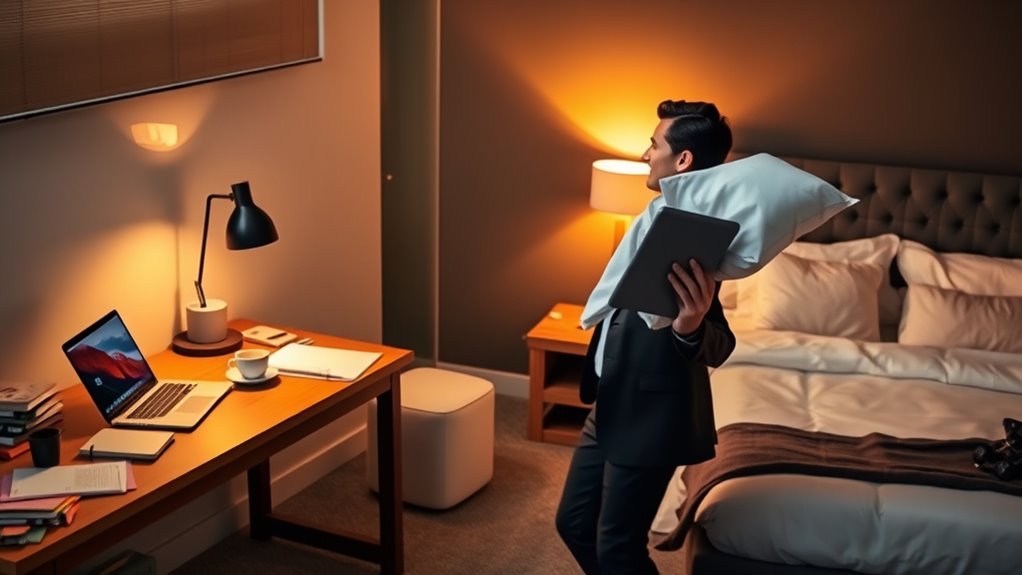To balance work and sleep effectively, prioritize your tasks and schedule demanding activities during your peak productivity times. Establish a consistent sleep routine by going to bed and waking up at the same time daily. Create a relaxing evening environment by dimming lights and avoiding screens. Manage your workload by setting boundaries and delegating when possible. These strategies will help you find harmony between work demands and restful sleep—continue exploring for more ways to optimize your routine.
Key Takeaways
- Prioritize demanding tasks during peak productivity periods and delegate less critical work to manage workload effectively.
- Establish a consistent sleep schedule by going to bed and waking up at the same times daily.
- Create a relaxing evening routine by dimming lights, avoiding screens, and engaging in calming activities.
- Optimize your sleep environment to be cool, dark, and quiet, supporting better rest and recovery.
- Plan your day in advance, breaking tasks into manageable chunks to reduce stress and prevent last-minute work.

Have you ever wondered how to juggle a busy work schedule without sacrificing your sleep? It’s a common challenge, especially when deadlines pile up and your to-do list keeps growing. The key lies in effective time management and prioritizing sleep hygiene. When you manage your time wisely, you create space for rest, making it easier to stay alert and productive during the day. Good sleep hygiene isn’t just about getting enough sleep; it’s about cultivating habits that promote restful sleep each night. By combining these strategies, you can find a balance that keeps both your work and health on track.
Start by evaluating how you spend your day. Identify periods when you’re most productive and plan to tackle your most demanding tasks during those times. This way, you won’t have to stay up late trying to finish work, which can disrupt your sleep schedule. Establish a consistent routine that aligns with your natural rhythms. Going to bed and waking up at the same time every day helps regulate your internal clock, making it easier to fall asleep and wake refreshed. This importance is vital for maintaining good sleep hygiene, as irregular sleep patterns can lead to difficulty sleeping and fatigue.
Identify your most productive times and establish routines to support restful sleep.
Make sure to set boundaries around your work hours. Once your workday ends, resist the urge to check emails or finish last-minute tasks. Instead, dedicate the evening to winding down in a way that promotes relaxation. Dim the lights, avoid screens at least an hour before bed, and engage in calming activities like reading or gentle stretches. These habits support sleep hygiene by signaling to your body that it’s time to relax, helping you fall asleep faster and enjoy deeper rest.
Time management also involves prioritizing tasks and learning to say no when necessary. Recognize that not everything is urgent, and delegate or postpone less critical work. This reduces stress and prevents work from bleeding into your personal time, which can interfere with your sleep. Planning your day in advance and breaking tasks into manageable chunks will prevent last-minute rushes that keep you awake at night.
Additionally, understanding the importance of projector technology can help you create a more effective and enjoyable home environment for relaxation or work presentations. Pay attention to your sleep environment. Keep your bedroom cool, dark, and quiet. Invest in a comfortable mattress and pillows. Creating a sanctuary for sleep reinforces good sleep hygiene and makes it easier to wind down at night. When you combine disciplined time management with a well-maintained sleep environment and habits, you’ll find it easier to balance your professional responsibilities with the restorative sleep your body needs. It’s about making intentional choices that support both your career ambitions and your health—and that balance is within your reach.
Frequently Asked Questions
How Can I Improve Sleep Quality During Stressful Work Periods?
During stressful work periods, improve your sleep quality by practicing good sleep hygiene, like maintaining a consistent sleep schedule and avoiding screens before bed. Incorporate stress management techniques such as deep breathing, meditation, or gentle stretching to calm your mind. Creating a relaxing bedtime routine helps signal your body it’s time to wind down. Prioritizing these habits guarantees better sleep, even during busy, stressful times.
Are Power Naps Effective for Busy Professionals?
Power naps are highly effective for busy professionals, boosting alertness and productivity. For example, a corporate executive took 20-minute power naps during work breaks, experiencing improved focus and reduced fatigue. The key is the power nap benefits, which include quick refreshment and mental clarity. To maximize these benefits, keep your naps around 10-20 minutes, as this ideal nap duration prevents grogginess and helps you stay energized throughout the day.
What Are Quick Relaxation Techniques Before Bedtime?
You can try quick relaxation techniques before bedtime by practicing breathing exercises or meditation techniques. Focus on slow, deep breaths to calm your mind and body, helping you unwind. Alternatively, engage in short meditation sessions to reduce stress and promote better sleep. These methods are simple, effective, and can be done in just a few minutes, making them perfect for busy professionals seeking a peaceful shift to rest.
How Does Caffeine Consumption Affect Sleep?
Ever wondered how caffeine impacts your sleep? Caffeine consumption can cause sleep disruption by blocking adenosine, the chemical that promotes relaxation and sleepiness. If you’re caffeine-dependent, you might find it harder to fall asleep or experience restless nights. To improve your sleep quality, consider reducing intake, especially in the afternoon and evening. Isn’t it worth waking up refreshed rather than groggy from poor sleep caused by caffeine?
Can Adjusting Work Hours Enhance Sleep Duration?
Adjusting your work hours can definitely enhance your sleep duration. By adopting flexible scheduling, you can start work earlier or later, aligning better with your natural sleep cycle. Create a sleep environment that’s cool, dark, and quiet to improve rest. When your work hours match your internal clock, you’ll find it easier to fall asleep and stay asleep, leading to more restorative sleep and better overall health.
Conclusion
Balancing work and sleep might seem tough, but it’s essential for your well-being. Remember, adults need about 7-9 hours of sleep per night, yet nearly 35% don’t get enough. Prioritize sleep by setting a consistent schedule and creating a relaxing bedtime routine. When you make sleep a priority, you’ll boost your productivity, mood, and overall health. So, take charge today—your body and mind will thank you for it.









